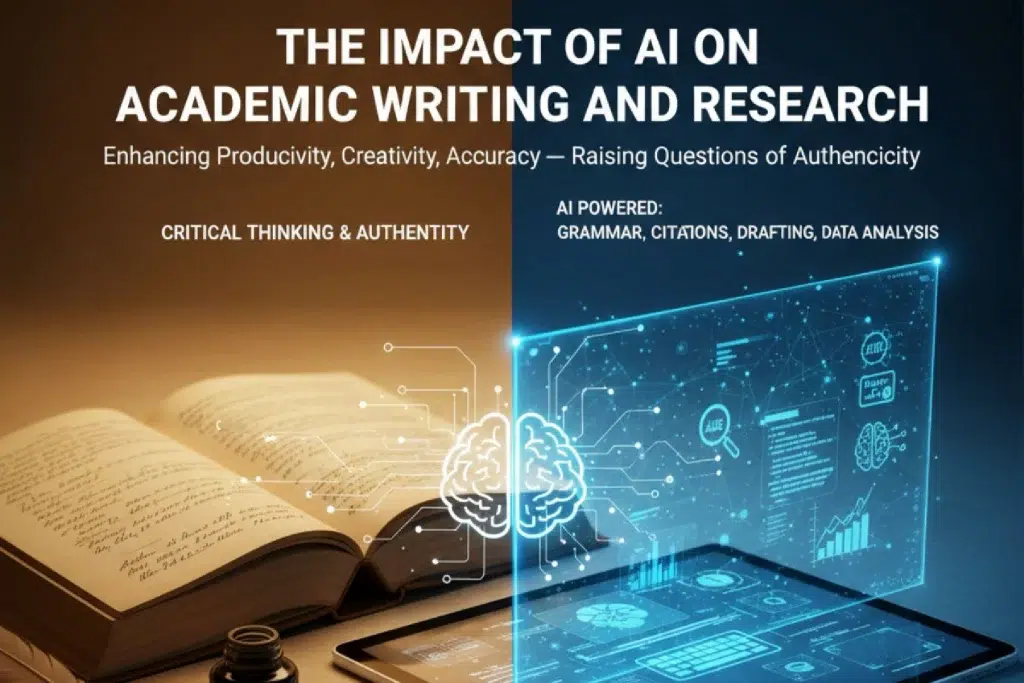
Artificial intelligence is changing almost every aspect of modern education, and academic writing and research are no exception. From free grammar corrector tools to citation generators, modern tech is helping students, teachers, and researchers create content faster and in a much smarter way.
While there is no doubt about the fact that AI makes research and writing more efficient, it is important to understand that it also comes with a unique set of challenges. In this guide, we are going to discuss in detail the impact of AI on academic writing and research skills. We hope that after reading this article, you will be able to understand how AI enhances productivity, what risks it poses, and how institutions can use AI responsibly.
Let’s start with the basics…
Rise of AI in the Academic World
In the past few years, AI platforms like ChatGPT, Gemini, Grammarly, HumanizeAI.net, Quillbot, and Turnitin have become important parts of a student’s toolkit. These online tools can help individuals manage various tasks such as generating essays, summarizing research material, detecting plagiarism, improving text quality, and humanizing robotic-sounding drafts.
AI tools have become much more than simple proofreading assistants. These can now co-author a detailed and well-structured paper with students, which is what makes them so popular & reliable.
Students today can easily use AI to improve writing quality and fluency, whereas researchers can use it to analyze large datasets and refine their dissertations. In simple words, AI has made academic writing more accessible and easier.
How AI Tools Enhance Academic Writing Skills?
There are tons of ways in which AI tools can help students fine-tune their academic write-ups. Here we have discussed a few notable ones:
- Improved Grammar and Clarity
AI tools like Grammarly can analyze your academic essays and assignments and offer detailed feedback on sentence structure, grammatical blunders, and stylistic issues.
Not only can these tools find and identify mistakes and give explanations, but they can also provide suggestions and alternative fixes. This constant guidance can help academic writers understand their mistakes and learn how to improve over time.
- Faster Writing and Editing
AI tools can generate outlines, suggest better phrases, rephrase complex sentences, and even write complete drafts from scratch within seconds. Academic writers can use AI generative solutions for creating a first draft for reference, especially if they’re unfamiliar with the topic or the assigned writing style.
This approach will allow them to focus more on finding facts, developing arguments, and managing deadlines rather than struggling with the first draft.
- Enhanced Vocabulary & Tone Control
Countless AI tools can also help with tone analysis and vocabulary suggestions. These tools can help writers learn how to write and maintain a consistent academic tone.
Students or writers who struggle with academic language and are not familiar with formal writing style can easily rely on AI tools and learn the right language and style. AI-generated samples can be a great source of learning for rookies.
- Citation and Formatting Assistance
Academic writing requires strict adherence to citation styles like APA, MLA, or Chicago.
AI citation managers and writing assistants can automatically format references, reducing errors and saving valuable time.
AI tools can help writers not just cite but also learn how to do it on their own, which is what makes them valuable.
- Humanizing & Removing Plagiarism
If you are constantly relying on AI tools for content generation, it is important to note that there is a very good chance that your content would be flagged as duplicate or robotic by Turnitin or other AI detection tools.
AI-generated content should be only used as guidance and not as your original submission if you don’t want to get accused of cheating.
Still, if your own drafts get accused of AI AI-generated or duplicates, you can leverage AI tools for a quick fix. You can use an AI plagiarism remover tool to rewrite unwanted duplicates without changing the original intent or core message of your essay/assignment.
Also, an AI humanizer tool can help you naturally paraphrase robotic-sounding text so that it bypasses advanced AI detection programs.
Role of AI in Strengthening Research Skills
As mentioned earlier, AI is not just helping writers; it is also redefining the research process. Academic research can be quite challenging as it includes collecting, analyzing, and interpreting large amounts of data; tasks that AI handles with remarkable efficiency.
- Quick Literature Review
You would be surprised to know that AI tools can scan thousands of papers in mere seconds. These tools can extract key points, identify research gaps, and summarize relevant findings.
This helps researchers speed up the process of literature review and focus more on analysis rather than on collecting data.
- Data Analysis & Visualization
AI-based analytical tools can process complex data sets, recognize trends, and even generate visual representations of results.
These tools make it easier for researchers to interpret data in a more accurate and efficient manner.
- Improved Research Accuracy
You must also know that by using AI tools, researchers can easily reduce human errors in data entry and analysis.
Advanced machine learning algorithms can easily identify inconsistencies, improve overall reliability, and ensure the validity of research material.
- Improved Collaboration
Many AI-powered tools can help improve research collaboration.
Using AI, multiple users can contribute, edit, and review academic content in real time and promote innovation and disciplined research work.
Challenges of Using AI Tools in the Academic World
Despite its many advantages, the excessive use of AI in academic writing and research raises several ethical and educational challenges. Some of these include:
- Plagiarism & Loss of Integrity
AI tools can generate content that might look original, but in reality, it is actually paraphrased from existing sources. There is always a chance that AI-generated content can be duplicated, which can result in accusations of plagiarism.
- Reduced Thinking Skills
Over-reliance on AI can weaken the ability of students or writers to think independently. When AI completes tasks like summarizing articles or drafting essays, students miss out on the cognitive learning process involved in creating original work.
- Loss of Personal Expression
Academic writing is not just about accuracy; it is about building and showcasing personal voice. AI tools would always produce uniform, robotic text, which can suppress one’s own personality in writing.
- Bias and Data Reliability
You might already know that AI generative solutions rely on existing data, which is why the content you get can definitely have inaccuracies or biases. Over-reliance on these tools can result in poor grades because of the poor presentation of facts.
- Privacy and Security Issues
You should also know that uploading your original research papers or sensitive data to AI platforms can raise privacy concerns. Data misuse or leaks could compromise the confidentiality of research projects.
Conclusion
AI is changing the way students and researchers write and learn. We can surely predict that in the future, classrooms might include AI tutors, smart writing tools, and automated review systems that support different learning styles.
Having said that, it is important to understand that AI’s real strength isn’t in replacing humans, it’s in helping them think deeper and work smarter.
The goal is to use AI to enhance human creativity, not limit it. As technology becomes a bigger part of education, students must learn to use it wisely, or else they can also get into serious trouble.
True academic success in the upcoming years would only come from combining human and AI capabilities!











